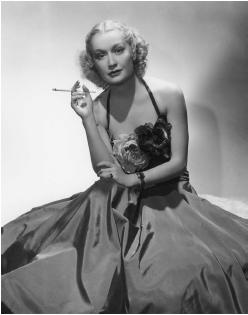Miriam Hopkins - Actors and Actresses
Nationality:
American.
Born:
Ellen Miriam Hopkins in Bainbridge, Georgia, 1902.
Education:
Attended Goddard Seminary, Vermont, and Syracuse University, New York.
Family:
Married 1) the actor Brandon Peters, 1926 (divorced 1931); 2) Austin
Parker, 1931 (divorced 1932), one adopted son; 3) the director Anatole
Litvak, 1937 (divorced 1939); 4) Raymond D. Brock, 1945 (divorced 1951).
Career:
1921—stage debut as chorus girl in
The Music Box Revue
, followed by vaudeville tours and dramatic roles on Broadway;
1928—film debut in short
The Home Girl
; 1931—contract with Paramount; later contracts with Goldwyn, 1935,
and Warner Brothers, 1938; 1940s—as leading parts declined,
returned to stage, and appeared in summer stock and touring companies;
1949—TV debut; 1953—directed and starred in
Hay Fever.
Died:
9 October 1972.
Films as Actress:
- 1928
-
The Home Girl (Lawrence—short)
- 1930
-
Fast and Loose (Newmeyer) (as Marion Lenox)

- 1931
-
The Smiling Lieutenant ( Le Lieutenant souriant ) (Lubitsch) (as Princess Anna); Twenty-Four Hours ( The Hours Between ) (Gering) (as Rosie Duggan)
- 1932
-
Dr. Jekyll and Mr. Hyde (Mamoulian) (as Ivy Pearson); Two Kinds of Women (DeMille) (as Emma Krull); Dancers in the Dark (Burton) (as Gloria Bishop); The World and the Flesh (Cromwell) (as Maria Yaskaya); Trouble in Paradise (Lubitsch) (as Lily Vantier)
- 1933
-
The Story of Temple Drake (Roberts) (title role); The Stranger's Return (King Vidor) (as Louise Storr); Design for Living (Lubitsch) (as Gilda Farrell)
- 1934
-
All of Me (Flood) (as Lydia Darrow); She Loves Me Not (Nugent) (as Curly Flagg); The Richest Girl in the World (Seiter) (as Dorothy Hunter)
- 1935
-
Becky Sharp (Mamoulian) (title role); Barbary Coast (Hawks) (as Mary Rutledge "Swan"); Splendor (Nugent) (as Phyllis)
- 1936
-
These Three (Wyler) (as Martha Dobie); Men Are Not Gods (Reisch) (as Ann Williams)
- 1937
-
The Woman I Love ( The Woman Between ) (Litvak) (as Helene Maury); Woman Chases Man (Blystone) (as Virginia Travis); Wise Girl (Jason) (as Susan Fletcher)
- 1939
-
The Old Maid (Goulding) (as Delia Lovell)
- 1940
-
Virginia City (Curtiz) (as Julia Haynes); The Lady with Red Hair (Bernhardt) (as Mrs. Leslie Carter)
- 1942
-
A Gentleman after Dark (Marin) (as Flo Melton)
- 1943
-
Old Acquaintance (Sherman) (as Millie)
- 1944
-
Skirmish on the Home Front (short)
- 1949
-
The Heiress (Wyler) (as Lavinia Penniman)
- 1950
-
The Mating Season (Leisen) (as Fran Carleton)
- 1951
-
Carrie (Wyler) (as Julia Hartswood)
- 1952
-
The Outcasts of Poker Flat (Newman) (as Duchess)
- 1961
-
The Children's Hour ( The Loudest Whisper ) (Wyler) (as Mrs. Lily Mortar)
- 1964
-
Fanny Hill ( Fanny Hill: Memoirs of a Woman of Pleasure ) (Meyer) (as Maude Brown)
- 1965
-
The Chase (Penn) (as Mrs. Reeves)
- 1970
-
Comeback ( Hollywood Horror House ) (Wolfe)
Publications
On HOPKINS: article—
Checklist, in Monthly Film Bulletin (London), December 1978.
Film Dope (Nottingham), November 1982.
Linssen, Céline, "'Unfortunately, I Am No Gentleman,': Miriam Hopkins," in Skrien (Amsterdam), August-September 1990.
* * *
Petite Miriam Hopkins commanded attention on-screen. Her Hollywood vogue lasted less than a decade, but Southern breeding and accent gave her work a no-nonsense graciousness which (particularly in her early films) proved attractively diverting.
Hopkins's work in musical and, later, dramatic theater led to Paramount's signing her in 1931. After a slow start, she essayed a succession of well-received portrayals and earned a top star position. She was Maurice Chevalier's partner in The Smiling Lieutenant , the trollop in Dr. Jekyll and Mr. Hyde , a charming jewel thief in Trouble in Paradise : apparent versatility served to her advantage.
Actually, the same ladylike bitchiness characterized most of her screen work. By the mid-1930s, fewer scripts met with her approval, and she switched to Goldwyn Studios and later to Warners. She played Becky Sharp , patterned on Thackeray's Vanity Fair , competing with the novelty of the first three-color process Technicolor feature. But These Three —Lillian Hellman's The Children's Hour reconstructed as a conventional triangle drama—displayed Hopkins at her best: likably crisp and energetic, capable of connecting with the emotional demands of the part.
She rivaled Bette Davis off and twice on-screen (in Old Acquaintance and The Old Maid ) but Davis won the audience sympathy and critical praise, since Hopkins tended to overdramatize. Increasingly, Hopkins abandoned Hollywood for the stage; she had picked up a reputation for feuding with co-stars.
Her own temperament and bad judgment of material, as much as the decreasing demand for her brand of histrionics, virtually ended her film career by the 1940s. She returned later in occasional character parts as shrewish, meddlesome relatives in The Heiress , Carrie , and, oddly, the remake of The Children's Hour.
—Richard Sater
Comment about this article, ask questions, or add new information about this topic: